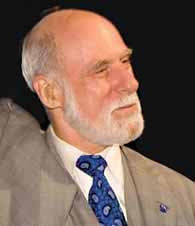|
Executive Interviews: Interview with Vinton G Cerf on Learning Organizations
July 2008
-
By Dr. Nagendra V Chowdary
 Vinton G Cerf
Vinton G Cerf Vinton G Cerf is Vice President Chief Internet Evangelist for Google. 
-
How to identify the need for being a
learning organization? Should some
companies in some industries for
instance IT, Consulting, Consumer
Electronics, Financial Services, etc
be more aggressive in being learning
organizations than other companies
from other industries?
I do not see that one company needs
to be more aggressive than another
about learning although it is fair to say
that companies in rapidly changing
markets are more in need of learning
than companies in relatively stable
markets.
|
|
-
How to create a learning organization?
What according to you should
be the defining DNA of a (to be) successful
learning organization? Are
there any sacrosanct principles that
an aspiring learning organization
should adhere to?
I amnot aware of any sacrosanct principles
except for the obvious one that
a learning company has to LEARN,
so that means it has to have leadership
that understands this need to
learn and adapt. -
What are the building blocks of a
learning organization?
Management that can learn and use
that learning to provide leadership.
Employees that are willing to adapt to
new practices and products and procedures. What is the role of knowledge management
in creating a learning organization?
Do you think that a learning
organization is the front end and
knowledge management is the back
end of a successful learning organization?
Are Chief Knowledge Officers
(CKOs) mandatory for all the learning
organizations?
I am not sure what a Chief Knowledge
Officer is so I cannot say that
such a person is mandatory. Companies
need to be able to measure themselves,
to know what customers are saying and expecting, to communicate
effectively with employees, to listen
to employees and customers.
Management needs to be supportive
and show leadership in learning. Should companies make any perceptible
changes to their organizational
structures to be successful
learning organizations? Any new hierarchical
arrangements and reporting
structures to be made?
I think this may orthogonal although
successful learning organizations are
probably flatter than the more hierarchical
ones. One is to become a (successful)
learning organization. Other is to be
benefited from being a learning organization.
However, how do we assess
whether an organization has become
truly a learning organization or not?
Are there any yardsticks to assess the
attainment of being a learning organization?
Perhaps just in simple terms, one can
assess the degree of learning by observing
the ability of the company to
adapt to changing requirements (management
and staff). What is the role of information technology
in fostering a learning culture?
Record keeping, corporate measurement,
effective tools for helping new
and existing employees to learn about
newprocedures contribute to the ability
of a company to adapt. What is the role of leadership in
creating a successful learning organization?
Leadership has to demonstrate by example
an ability to learn from mistakes
or from changing conditions.
1.
Learning Organization Case Study
2. ICMR
Case Collection
3.
Case Study Volumes
|
